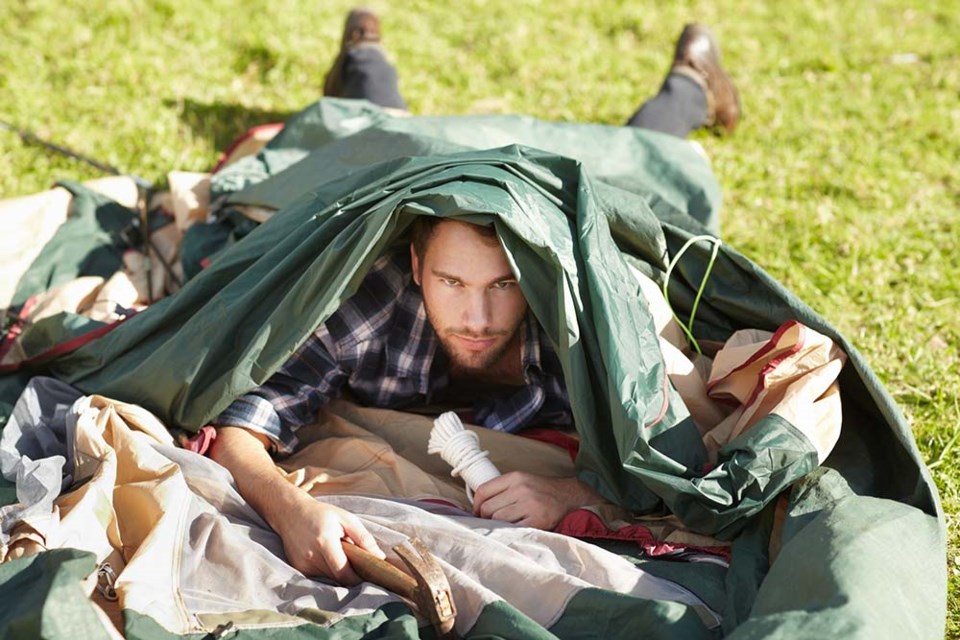OTTAWA, Ont. — According to Scouts Canada, the country's leading co-ed youth organization, the average Canadian may be surprisingly stumped by camping basics. Outdoor and camping skills are good for more than just a fun weekend in nature; adventure-based play outside leads to better-developed motor skills, social behaviour, independence, and conflict resolution skills that support physical and mental wellbeing in youth development.
The recent national survey by Scouts Canada of 1,000 Canadians uncovered the following:
Key Findings (national):
1) 'Bear'ly ready
Asked what they would do if they encountered a black bear in the woods, a total of 23.2 per cent of Canadians would do the wrong thing, such as: “Run” (8.6 per cent), "Play Metallica on iPhone and live stream"(5.6 per cent), “stare directly into their eyes to scare them” (5.5 per cent) or (an extremely bad idea) "attack first" (3.2 per cent); 14.9 per cent of Canadians simply said that they don't know.
2) Don't Eat That!
Asked which plants from a list of wild plants were safe to eat, 46.7 per cent of Canadians flat out admitted they had “no idea.” A total of 26.4 per cent of Canadians incorrectly identified wild plants such as winterberry and buckthorn as “safe to eat” (they are NOT.)
“We're having a little fun with this survey, but the real point is that we wanted to understand the gaps that Canadians are facing in their connection with nature and important outdoor skills, and how Scouting meets that need by grounding kids in real-world experiences that prepare them for life,” said Siobhan Ward, Youth Program Specialist and Rover Scout with Scouts Canada. “When families and youth in Canada are empowered with skills to enjoy fun outdoor adventures with confidence and safety, they are also set up for success in the world as resilient, capable and well-rounded individuals.”
3) Canadians admit that they're pretty “meh” at camping
Asked to rate the camping competence of “most Canadians” respondents of the survey were generally positive with 61.7 per cent answering “OK.” Twelve per cent optimistically said “high.”
14.7 per cent said "poor."
6.4 per cent said "bad."
5.2 per cent said "dangerous."
4) Canadians question their own camping competence
Asked to rate their own level of camping competence, only 36.3 per cent of Canadians said "OK," while 39 per cent admitted their skills are poor at best, if not outright dangerous (as in burn down the tent kind, drink from a puddle, couldn't make it through the night kind of dangerous).
“We're calling on seasoned Canadian campers and nature lovers who DO know what they are doing to volunteer and help even more youth in Canada benefit from Scouting. We're also calling on individuals who are passionate about youth leadership and empowerment, to volunteer and develop outdoor skills along their Scouting journey through training and peer support,” added Ward.
5) Wet and Wild
Asked how to properly dry wet clothing and gear, almost half of Canadians (46.9 per cent) said they “don't know."
7.2 per cent would make the bad choice of "placing items three inches from a fire."
4.5 per cent would (inefficiently) choose to "flap until dry."
3.2 per cent would "blow on them until dry" (this is not advised.)
2.2 per cent would "wrap in a jacket to absorb moisture."
On the plus side, 36 per cent correctly responded "wring out and drape."
6) 'Tents' situation
Canadians generally don't seem confident in their ability to set up a tent. Asked how long they thought pitching a tent would take them, 35.7 per cent said “they have no idea" (suggesting that it might take a while.) Conveniently, the average Scout can set up their own tent in 15 minutes.
15.2 per cent said "30 minutes."
10.0 per cent said "45+ minutes."
11.4 per cent optimistically said "5 minutes or less," and 27.7 per cent said "10-25 minutes."
7) Bonus findings, worst camping mistakes:
Asked what Canadians considered to be their biggest camping mistakes, respondents had a variety of colourful anecdotes:
a) “Sleeping in a tent and cougars were mating in the middle of the night … claws through the tent …”
b) “Eating moss”
c) “Forgot glasses”
d) “Going to outhouse in the dark”
e) Flooding-related issues including: “set up tent facing rain so filled with water,” “Groundsheet set up incorrectly so caused a massive flood.”
f) “Locked key in car”
g) “Ran over my phone”
h) “Burned tent with hot lantern”
About Scouts Canada
Kids and young adults in Scouts chart their own path of discovery. Through a variety of fun experiences with friends, outdoor adventures and contributions to their community, Scouts build resilience and skills that set them up for life. Scouts Canada is the country's leading co-ed youth organization, offering programming for children and youth aged 5-26 in multiple languages, reflecting Canada's multicultural landscape and communities. For more information, visit Scouts.ca.
Scouts Canada is a not-for-profit organization (Charitable Registration No.10776 1694 RR0028) and a member of the World Organization of the Scout Movement.




